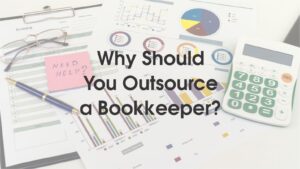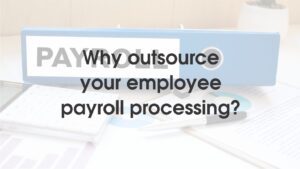Small Business Accountant: What No One Is Talking About
Running a small business involves wearing multiple hats, from managing operations and marketing to customer service and financial management. While entrepreneurs often handle these responsibilities, one crucial aspect often overlooked or underestimated is professional accounting. Small business accountants play a vital role in ensuring a business’s financial health and success. This blog will explore what a small business accountant does, the benefits of outsourcing accounting services, why your small business needs an accountant, tips for selecting the right accountant, and how to prepare your business for 2023.
What does a Small Business Accountant do?
A small business accountant is a financial professional specializing in accounting services to small businesses. They handle various financial tasks, including bookkeeping, preparing financial statements, managing payroll, handling tax compliance, and providing valuable financial advice to business owners. Small business accountants possess expertise in analyzing financial data, identifying trends, and providing insights that help business owners make informed decisions.
Bookkeeping is a crucial aspect of a small business accountant’s role. They ensure that all financial transactions, including sales, expenses, and payments, are accurately recorded. By maintaining accurate and up-to-date financial records, accountants help business owners understand the financial health of their company and make strategic decisions based on reliable data.
In addition to bookkeeping, small business accountants handle payroll management. They ensure that employee wages are calculated correctly, taxes and deductions are withheld, and payroll tax returns are filed on time. Managing payroll can be complex, with changing regulations and various employee benefits to consider. Accountants ensure compliance with employment tax laws and ensure employees receive accurate and timely payments.
Tax compliance is another crucial area where small business accountants excel. They stay updated with the latest tax laws and regulations and ensure businesses meet their tax obligations. Accountants help small businesses navigate the complexities of tax preparation, ensuring that all deductions and credits are properly claimed while minimizing the risk of errors or audits.
Beyond day-to-day financial tasks, small business accountants provide valuable financial analysis and advice. They analyze financial statements, identify areas of improvement, and help businesses develop strategies to increase profitability and minimize expenses. Accountants assist in budgeting and forecasting, providing insights into cash flow management and identifying growth opportunities.
The Benefits of Outsourcing Your Business Accountant:
Outsourcing your small business accounting services can offer several advantages. Firstly, it allows you to focus on your core business activities and strategic goals, as the burden of managing financial records and complying with tax regulations is transferred to experts. By outsourcing accounting tasks, you can free up valuable time and resources, enabling you to concentrate on growing your business.
Outsourcing accounting services provides access to specialized knowledge and experience that may not be available in-house. Small business accountants know tax laws, accounting principles, and industry-specific financial practices. They bring expertise and insights that can help streamline financial processes, identify cost-saving opportunities, and improve overall financial management.
Another significant benefit of outsourcing is cost savings. Hiring a full-time, in-house accountant can be expensive for small businesses, especially considering salary, benefits, and training costs. You can avoid these overhead expenses by outsourcing accounting services while receiving top-quality financial expertise. Outsourcing is often more cost-effective than maintaining an in-house accounting department, making it an attractive option for small businesses.
Moreover, outsourcing accounting services can enhance data security and minimize the risk of fraud. Professional accounting firms have robust systems and procedures to ensure your financial data’s confidentiality and integrity. They employ security measures such as data encryption, secure servers, and regular backups, providing your business peace of mind and protection.
5 Reasons Why Your Small Business Needs an Accountant:
Compliance with Tax Regulations:
Tax regulations can be complex and ever-changing. Failing to comply with tax laws can result in penalties, fines, or even legal issues for your small business. A small business accountant stays updated with the latest tax regulations and ensures that your business remains compliant. They have the knowledge and expertise to navigate the intricacies of tax laws and help you meet your tax obligations accurately and on time.
Accountants are well-versed in tax planning strategies and can identify deductions and credits that you may not be aware of. They ensure that your tax returns are prepared accurately, minimizing the risk of errors or omissions that could trigger audits or additional scrutiny from tax authorities. By enlisting the help of an accountant, you can have peace of mind knowing that your tax compliance is in capable hands.
Financial Analysis and Planning:
Accountants provide valuable financial analysis and insights that can help your small business thrive. They go beyond merely recording and categorizing transactions; they analyze your financial statements and identify trends and patterns that can inform your business decisions.
With their expertise, accountants can help you develop realistic budgets, set financial goals, and create forecasts for your business. They assess your financial performance, identify areas of improvement, and provide recommendations to enhance profitability and reduce costs. By working closely with an accountant, you better understand your business’s financial health, enabling you to make informed decisions that drive growth and success.
Time and Cost Savings:
Managing your own financial records can be time-consuming and can divert your focus from core business activities. Hiring a professional accountant can free up valuable time and allow you to concentrate on growing your business. Accountants are skilled in handling financial tasks efficiently and accurately, allowing you to delegate those responsibilities to someone with expertise in the field.
Moreover, accountants can help identify cost-saving opportunities within your business. They analyze your financial data, identify unnecessary expenses, and suggest ways to optimize cash flow. By leveraging their knowledge, you can make informed decisions that minimize costs and maximize profitability. The cost savings and increased efficiency gained by outsourcing your accounting needs outweigh the expense of hiring an accountant.
Enhanced Accuracy:
Accountants are meticulous when it comes to financial record-keeping and maintaining accurate books. They have a keen eye for detail and ensure that transactions are properly recorded, reconciled, and categorized. By relying on their expertise, you can have confidence in the accuracy and reliability of your financial data.
Having accurate financial records is crucial for making informed business decisions. Reliable financial data allows you to assess your business’s performance, identify trends, and spot potential issues early on. Accurate books also provide a solid foundation for financial reporting, tax preparation, and audits. By entrusting your financial record-keeping to an accountant, you reduce the risk of errors and can have peace of mind knowing that your financial data is reliable.
Business Growth and Expansion:
As your small business grows and expands, the financial complexities increase. An accountant can provide valuable advice and support during these periods of growth. They can help you navigate financial challenges, such as securing financing for expansion or managing cash flow during rapid growth.
Accountants understand the financial implications of business growth and can assist in developing strategies to support your expansion plans. They can perform financial analysis to evaluate the viability of new opportunities and help you make informed decisions. By having an accountant as a trusted advisor, you can confidently pursue growth opportunities while minimizing financial risks.
7 Tips for Small Businesses on Selecting the Right Accountant:
Assess Your Needs:
Before you search for an accountant, assessing your specific accounting needs is important. Determine the scope of services you require, such as bookkeeping, tax preparation, financial analysis, or budgeting assistance. Understanding your needs will help you find an accountant specializing in your business’s most relevant areas.
Qualifications and Experience:
Verify the qualifications and experience of potential accountants. Look for professionals who hold relevant certifications, such as Certified Public Accountant (CPA) or Chartered Professional Accountant (CPA). Consider their level of experience, particularly with small businesses in your industry. An accountant with experience in your field will be familiar with industry-specific regulations and financial practices.
Request references from previous or current clients to understand their expertise and reliability. Client testimonials or case studies can provide valuable insights into the quality of their services.
Industry Knowledge:
Choose an accountant who has a solid understanding of your industry. Different industries have unique financial challenges, regulations, and tax implications. An accountant knowledgeable about your industry will be better equipped to handle your specific accounting needs and provide relevant advice.
During the selection process, ask potential accountants about their experience working with businesses in your industry. Inquire about the industry-specific challenges they have encountered and how they have helped clients overcome them.
Technology and Tools:
Inquire about the accounting software and tools the accountant or accounting firm uses. Modern technology plays a crucial role in streamlining financial processes and ensuring accuracy. Using cloud-based accounting software can facilitate collaboration and provide real-time access to financial data.
Ensure that the accountant is up to date with the latest accounting software and technology. They should be proficient in using tools that can simplify tasks such as bookkeeping, payroll management, and financial reporting. Embracing technology can improve efficiency, reduce errors, and provide better insights into your business’s financial health.
Communication and Accessibility:
Clear and effective communication is key to a successful accountant-client relationship. Choose a responsive accountant who communicates clearly, and listens attentively to your concerns and goals. Accessibility is also crucial; you may need to contact your accountant for urgent matters or advice.
During the selection process, evaluate the accountant’s communication style. Do they explain financial concepts in a way that is easy to understand? Do they proactively communicate updates or changes that may affect your business? Look for an accountant who is proactive, transparent, and maintains open lines of communication.
Fees and Pricing Structure:
Discuss fees and pricing structure upfront to avoid any surprises. Accountants may have different fee structures, such as hourly rates, monthly retainers, or project-based fees. Consider the value provided by the accountant in relation to the fees they charge.
While cost is important, it should not be the sole determining factor. A highly experienced and reputable accountant may charge higher fees but provide a greater return on investment through their expertise, accuracy, and financial guidance. Assess the overall value and consider how the accountant’s services align with your budget and business goals.
Compatibility and Trust:
Building a trusting relationship with your accountant is crucial. Look for someone who possesses the necessary expertise and understands your business goals, values, and aspirations. Compatibility in terms of work style, approach, and culture can contribute to a strong accountant-client relationship.
Consider scheduling an initial consultation or interview with potential accountants to assess compatibility. Ask questions about their approach to client relationships, understanding of your business, and commitment to your success. Trust is the foundation of a successful partnership, so choose an accountant you feel comfortable with and who demonstrates a genuine interest in helping your business thrive.
By following these tips, you can find an accountant who meets your specific accounting needs and becomes a valuable partner in your business’s financial success. Take the time to evaluate and choose an accountant who aligns with your goals, brings relevant industry knowledge, and possesses the necessary qualifications and expertise to support your business’s financial health and growth.
Is your small business ready for 2023?
As we enter 2023, small businesses must be financially prepared for the challenges and opportunities. Consider these key steps to get your business ready:
Review and Update Financial Records: Conduct a thorough review of your financial records, ensuring accuracy and completeness. Update any outdated information and reconcile accounts. This includes bank statements, invoices, receipts, and other financial documents. Accurate and up-to-date records provide a solid foundation for financial analysis and decision-making.
Set Realistic Financial Goals: Define your financial goals for the year, both short-term and long-term. Establish key performance indicators (KPIs) to track progress and measure success. Your goals should align with your business objectives and consider market conditions and industry trends. Setting realistic and measurable goals will help guide your financial strategies and actions throughout the year.
Tax Planning: Collaborate with your small business accountant to develop a tax planning strategy that maximizes deductions and minimizes liabilities. Stay informed about any new tax laws or incentives that could benefit your business. Tax planning should be an ongoing process, not just a year-end activity. By proactively managing your taxes, you can optimize your financial position and minimize surprises when it’s time to file your returns.
Cash Flow Management: Monitor your cash flow closely and implement optimized strategies. Cash flow is the lifeblood of any business, and effective management is essential for stability and growth. Work with your accountant to forecast cash flow, identify potential shortfalls, and explore financing options. Implementing cash flow management strategies such as improving collections, managing inventory levels, and negotiating favorable payment terms with suppliers can enhance your business’s financial health.
Regular Financial Reviews: Schedule regular meetings with your accountant to review financial reports, assess performance against goals, and make necessary adjustments to your financial strategy. Regular financial reviews provide opportunities to identify areas for improvement, address challenges, and ensure that your business stays on track. Your accountant can provide insights and recommendations based on their analysis of your financial data, helping you make informed decisions to drive your business forward.
Technology Adoption: Embrace technology that can streamline your financial processes and provide real-time insights into your business’s financial health. Cloud-based accounting software, expense-tracking apps, and automated invoicing systems can save time, reduce errors, and improve efficiency. Work with your accountant to identify the right technology tools for your business and ensure seamless integration with your financial systems.
Continuous Learning and Adaptation: The business landscape constantly evolves, and staying ahead requires continuous learning and adaptation. Stay informed about industry trends, regulatory changes, and emerging technologies that can impact your business. Invest in professional development opportunities for yourself and your team to enhance financial literacy and keep up with best practices in financial management.
Conclusion:
A small business accountant plays a crucial role in ensuring your business’s financial stability and growth. By outsourcing accounting services, you can benefit from their expertise while focusing on your core business activities. Remember to select an accountant that aligns with your business needs and values. As we step into 2023, preparing your business for the year ahead will set the stage for success and provide a solid foundation for achieving your financial goals. By reviewing and updating financial records, setting realistic goals, collaborating with your accountant, and embracing technology, you can position your small business for financial success in the coming year and beyond.




